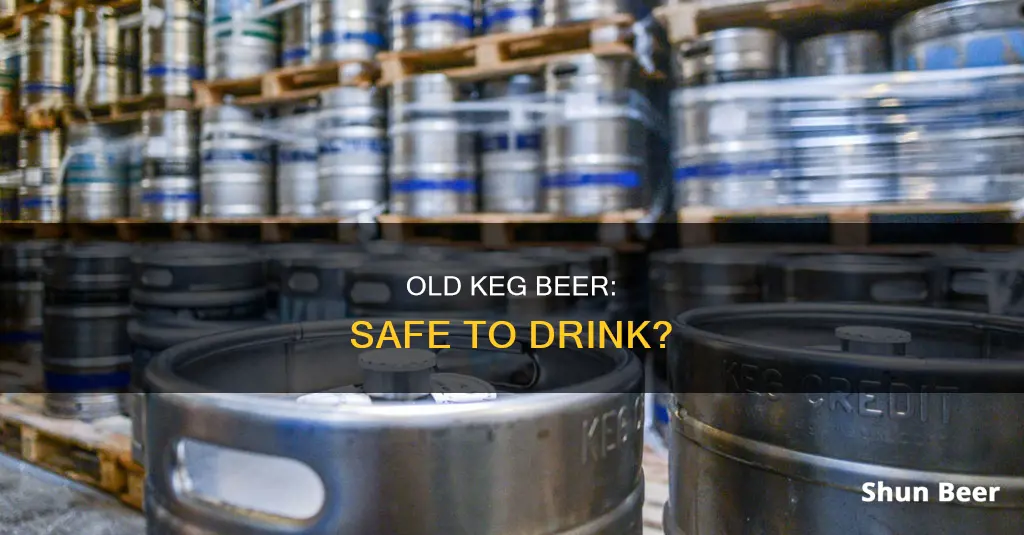
There are many factors that determine whether old keg beer is safe to drink. The first is the type of beer: pasteurized beer will last 90-120 days, while unpasteurized beer will last 45-60 days. The second is the method of dispensing: using a manual pump will expose the beer to oxygen, which will cause it to go stale and spoil within 8-24 hours, while using a kegerator with CO2 will keep the beer fresh for months. The third is the storage temperature: the ideal temperature is 38°F, and if the temperature rises above 50°F, bacteria may start to form. Therefore, to ensure that old keg beer is safe to drink, it is important to consider the type of beer, the dispensing method, and the storage temperature.

Pasteurized vs. unpasteurized beer
Pasteurization is a process that heats a liquid to a temperature that kills off bacteria and dangerous microbes. This process was first invented by French scientist Louis Pasteur, who discovered that fluids can be partially sterilized at high temperatures. Beer is heated to around 212°F (100°C) during pasteurization.
Craft breweries rarely pasteurize their beers, whereas many commercial and domestic beers—like Budweiser (excluding the Budvar variety), Coors, and Miller—are always pasteurized. Pasteurization extends the shelf life of beer, with pasteurized beer remaining fresh-tasting for about six to nine months, and some lasting up to a year in the refrigerator. Unpasteurized beers typically last between 60 to 180 days, depending on packaging and refrigeration.
Unpasteurized beer has a better taste and offers health benefits since it is not subjected to heat. It contains live yeast, which is an effective way of getting vitamin B complexes. It also has probiotics that can boost gut health, though alcohol negates this if consumed in large quantities. The yeast in unpasteurized beer will grow unfettered, enhancing the flavor of the beer.
However, the main downside of pasteurization is that it can alter the taste and destroy the natural yeast and enzymes in the beers, along with potential health benefits.
Old Beer: Is It Safe to Drink After Three Years?
You may want to see also

Shelf life
The shelf life of keg beer depends on a variety of factors, including the type of beer, the way it is dispensed, and how it is stored.
Pasteurized beer typically has a shelf life of about 90-120 days (3-4 months), while unpasteurized draft beer will last approximately 45-60 days (6-8 weeks) when stored at the proper temperature. It is important to note that the countdown for the shelf life starts from the day the keg is filled at the brewery, not when it is tapped or purchased. Therefore, checking the "born on" date or expiration date on the label is crucial in determining how long the beer will remain fresh.
The method of dispensing the beer also significantly impacts its shelf life. Using a manual pump, party pump, or picnic pump that introduces oxygen into the keg can cause the beer to go flat and spoil within 12-24 hours. On the other hand, using a kegerator or draft system with CO2 helps maintain the freshness of the beer for months, as long as it is stored at the proper temperature and pressure.
Storing a keg of beer at the recommended temperature of 38°F is crucial to preserving its freshness and optimal pouring. Allowing the temperature to rise above 50°F can lead to bacterial growth, spoiling the beer. Similarly, storing beer at too cold a temperature can affect its flavour and aroma. Therefore, it is essential to maintain the recommended temperature range to ensure the beer remains fresh and drinkable.
Morning Beer: Should You Drink Before Work?
You may want to see also

Oxygen and CO2
Manual pumps, also known as party or picnic pumps, introduce oxygen into the keg to pressurise it and dispense the beer. This oxygen causes the beer to go flat and spoil within 12-24 hours, depending on the type of beer and the amount of oxygen pumped into the keg. Therefore, if using a manual pump, the keg should be finished within a day to avoid spoilage.
On the other hand, kegerators or draft systems that use CO2 to dispense the beer keep it fresh for much longer by avoiding oxidation. In this case, the beer can remain fresh for months, depending on whether it is pasteurised or unpasteurised and stored at the correct temperature. Pasteurised beer will last for about 3-4 months, while unpasteurised beer will last for about 6-8 weeks when stored at the proper temperature.
To ensure the freshness of keg beer, it is crucial to keep oxygen out of the keg, maintain the appropriate temperature, and use a dispensing method that does not introduce oxygen, such as a kegerator with CO2. By following these guidelines, you can safely consume old keg beer that has been stored and dispensed properly.
Beer After a Workout: Good or Bad Idea?
You may want to see also

Temperature
Additionally, if the temperature rises above 50°F (10°C), bacteria can form and spoil the beer. On the other hand, keeping the beer too cold can also be detrimental. If the temperature falls below 28°F (-2.2°C), the beer will likely freeze, and the true flavour and aroma of the beer will not be experienced if served too cold.
Therefore, it is crucial to maintain the recommended temperature for storing keg beer to ensure optimal freshness and taste. This can be achieved by storing the keg in a kegerator or a converted refrigerator to maintain the desired temperature at all times. By prioritising proper temperature control, you can effectively extend the shelf life of your keg beer and enjoy it at its best.
California Beach Beer Drinking: What's Allowed?
You may want to see also

Bacteria
The method of dispensing the beer from the keg also affects how long it stays fresh. Using a manual pump introduces oxygen into the keg, which causes the beer to go flat and spoil quickly. With a manual pump, you will have around eight hours to finish the keg before the beer starts to taste stale.
Using a kegerator or draft system that dispenses beer using CO2 will help maintain the beer's freshness, provided the keg is stored at the proper temperature and pressure.
Should Beer Be Served With Ice?
You may want to see also
Frequently asked questions
There is no one answer to this question as it depends on the type of beer and how it is stored. A good rule of thumb is that a keg of pasteurized beer will last about 90-120 days (3-4 months) and an unpasteurized draft beer will last about 45-60 days (6-8 weeks) when stored at the proper temperature.
Using a kegerator or draft system that dispenses beer using CO2 is the best way to keep beer fresh as it avoids oxidation. With this method, beer can remain fresh for months.
The recommended temperature for storing draft beer is 38°F. Beer should not be stored at room temperature as bacteria can form if the temperature rises above 50°F. Beer should also not be stored too cold as this will affect its flavor and aroma.







